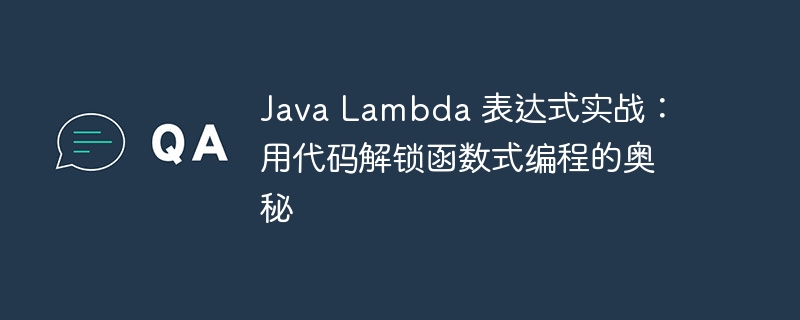

php editor Strawberry takes you to explore the magic of Java Lambda expressions! Through this practical guide, you will learn how to use Lambda expressions to unlock the secrets of functional programming. No need for cumbersome code, just concise syntax, allowing you to easily experience the charm of functional programming. Follow us to explore Java Lambda expressions and open up a new horizon of programming!
1. Basic syntax of Lambda expression
The basic syntax of Lambda expression is as follows:
(参数列表) -> {代码块}Among them, the parameter list and code block are optional. If there is only one parameter, the parentheses can be omitted. If the code block is only one line, the curly braces can be omitted. For example, the following code block uses a Lambda expression to add 1 to a number:
List<Integer> numbers = Arrays.asList(1, 2, 3, 4, 5); List<Integer> incrementedNumbers = numbers.stream() .map(n -> n + 1) .collect(Collectors.toList());
In the above code, the Lambda expression n -> n 1 receives a number as a parameter, adds 1 to it and returns it.
2. Usage scenarios of Lambda expressions
Lambda expressions can be applied to a variety of scenarios, including:
3. Closure characteristics of Lambda expressions
Lambda expression has closure property, which means that it can access variables within the scope of its definition. For example, the following code block uses a Lambda expression to multiply a number by a constant:
int multiplier = 10; List<Integer> numbers = Arrays.asList(1, 2, 3, 4, 5); List<Integer> multipliedNumbers = numbers.stream() .map(n -> n * multiplier) .collect(Collectors.toList());
In the above code, the Lambda expression n -> n * multiplier can access the variable multiplier within its definition scope.
4. Limitations of Lambda expressions
Although Lamba expressions have many advantages, they also have some limitations. For example, a lambda expression cannot declare its own parameter types, nor can it use try-catch statements. Additionally, a lambda expression can only access variables within the scope of its definition, which may impose some limitations.
in conclusion:
Lambda expressions are an important feature introduced in Java 8 that allow for a cleaner and more expressive way to write code. Lambda expressions are great for processing data streams and parallel calculations, and they can significantly speed up the execution of certain tasks. Although lambda expressions have some limitations, their advantages far outweigh their disadvantages. Mastering lambda expressions can help you write more elegant and efficient Java code.
The above is the detailed content of Java Lambda Expression in Practice: Unlocking the Mysteries of Functional Programming with Code. For more information, please follow other related articles on the PHP Chinese website!




